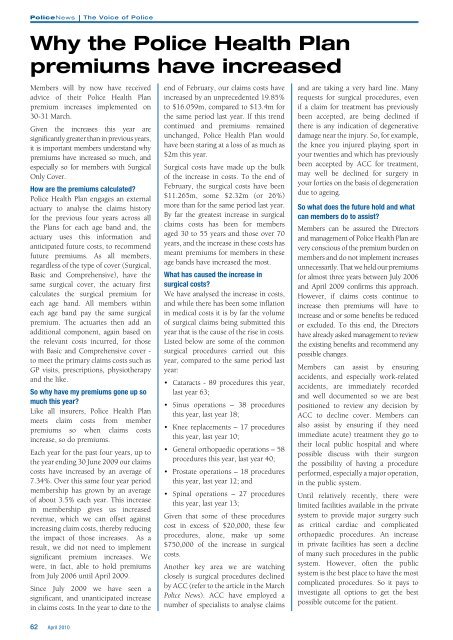Total recorded assaults on Police - New Zealand Police Association
Total recorded assaults on Police - New Zealand Police Association
Total recorded assaults on Police - New Zealand Police Association
Create successful ePaper yourself
Turn your PDF publications into a flip-book with our unique Google optimized e-Paper software.
<strong>Police</strong><strong>New</strong>sThe Voice of <strong>Police</strong>Why the <strong>Police</strong> Health Planpremiums have increasedMembers will by now have receivedadvice of their <strong>Police</strong> Health Planpremium increases implemented <strong>on</strong>30-31 March.Given the increases this year aresignificantly greater than in previous years,it is important members understand whypremiums have increased so much, andespecially so for members with SurgicalOnly Cover.How are the premiums calculated?<strong>Police</strong> Health Plan engages an externalactuary to analyse the claims historyfor the previous four years across allthe Plans for each age band and, theactuary uses this informati<strong>on</strong> andanticipated future costs, to recommendfuture premiums. As all members,regardless of the type of cover (Surgical,Basic and Comprehensive), have thesame surgical cover, the actuary firstcalculates the surgical premium foreach age band. All members withineach age band pay the same surgicalpremium. The actuaries then add anadditi<strong>on</strong>al comp<strong>on</strong>ent, again based <strong>on</strong>the relevant costs incurred, for thosewith Basic and Comprehensive cover -to meet the primary claims costs such asGP visits, prescripti<strong>on</strong>s, physiotherapyand the like.So why have my premiums g<strong>on</strong>e up somuch this year?Like all insurers, <strong>Police</strong> Health Planmeets claim costs from memberpremiums so when claims costsincrease, so do premiums.Each year for the past four years, up tothe year ending 30 June 2009 our claimscosts have increased by an average of7.34%. Over this same four year periodmembership has grown by an averageof about 3.5% each year. This increasein membership gives us increasedrevenue, which we can offset againstincreasing claim costs, thereby reducingthe impact of those increases. As aresult, we did not need to implementsignificant premium increases. Wewere, in fact, able to hold premiumsfrom July 2006 until April 2009.Since July 2009 we have seen asignificant, and unanticipated increasein claims costs. In the year to date to theend of February, our claims costs haveincreased by an unprecedented 19.85%to $16.059m, compared to $13.4m forthe same period last year. If this trendc<strong>on</strong>tinued and premiums remainedunchanged, <strong>Police</strong> Health Plan wouldhave been staring at a loss of as much as$2m this year.Surgical costs have made up the bulkof the increase in costs. To the end ofFebruary, the surgical costs have been$11.265m, some $2.32m (or 26%)more than for the same period last year.By far the greatest increase in surgicalclaims costs has been for membersaged 30 to 55 years and those over 70years, and the increase in these costs hasmeant premiums for members in theseage bands have increased the most.What has caused the increase insurgical costs?We have analysed the increase in costs,and while there has been some inflati<strong>on</strong>in medical costs it is by far the volumeof surgical claims being submitted thisyear that is the cause of the rise in costs.Listed below are some of the comm<strong>on</strong>surgical procedures carried out thisyear, compared to the same period lastyear:• Cataracts - 89 procedures this year,last year 63;• Sinus operati<strong>on</strong>s – 38 proceduresthis year, last year 18;• Knee replacements – 17 proceduresthis year, last year 10;• General orthopaedic operati<strong>on</strong>s – 58procedures this year, last year 40;• Prostate operati<strong>on</strong>s – 18 proceduresthis year, last year 12; and• Spinal operati<strong>on</strong>s – 27 proceduresthis year, last year 13;Given that some of these procedurescost in excess of $20,000, these fewprocedures, al<strong>on</strong>e, make up some$750,000 of the increase in surgicalcosts.Another key area we are watchingclosely is surgical procedures declinedby ACC (refer to the article in the March<strong>Police</strong> <strong>New</strong>s). ACC have employed anumber of specialists to analyse claimsand are taking a very hard line. Manyrequests for surgical procedures, evenif a claim for treatment has previouslybeen accepted, are being declined ifthere is any indicati<strong>on</strong> of degenerativedamage near the injury. So, for example,the knee you injured playing sport inyour twenties and which has previouslybeen accepted by ACC for treatment,may well be declined for surgery inyour forties <strong>on</strong> the basis of degenerati<strong>on</strong>due to ageing.So what does the future hold and whatcan members do to assist?Members can be assured the Directorsand management of <strong>Police</strong> Health Plan arevery c<strong>on</strong>scious of the premium burden <strong>on</strong>members and do not implement increasesunnecessarily. That we held our premiumsfor almost three years between July 2006and April 2009 c<strong>on</strong>firms this approach.However, if claims costs c<strong>on</strong>tinue toincrease then premiums will have toincrease and or some benefits be reducedor excluded. To this end, the Directorshave already asked management to reviewthe existing benefits and recommend anypossible changes.Members can assist by ensuringaccidents, and especially work-relatedaccidents, are immediately <str<strong>on</strong>g>recorded</str<strong>on</strong>g>and well documented so we are bestpositi<strong>on</strong>ed to review any decisi<strong>on</strong> byACC to decline cover. Members canalso assist by ensuring if they needimmediate acute) treatment they go totheir local public hospital and wherepossible discuss with their surge<strong>on</strong>the possibility of having a procedureperformed, especially a major operati<strong>on</strong>,in the public system.Until relatively recently, there werelimited facilities available in the privatesystem to provide major surgery suchas critical cardiac and complicatedorthopaedic procedures. An increasein private facilities has seen a declineof many such procedures in the publicsystem. However, often the publicsystem is the best place to have the mostcomplicated procedures. So it pays toinvestigate all opti<strong>on</strong>s to get the bestpossible outcome for the patient.62April 2010

















